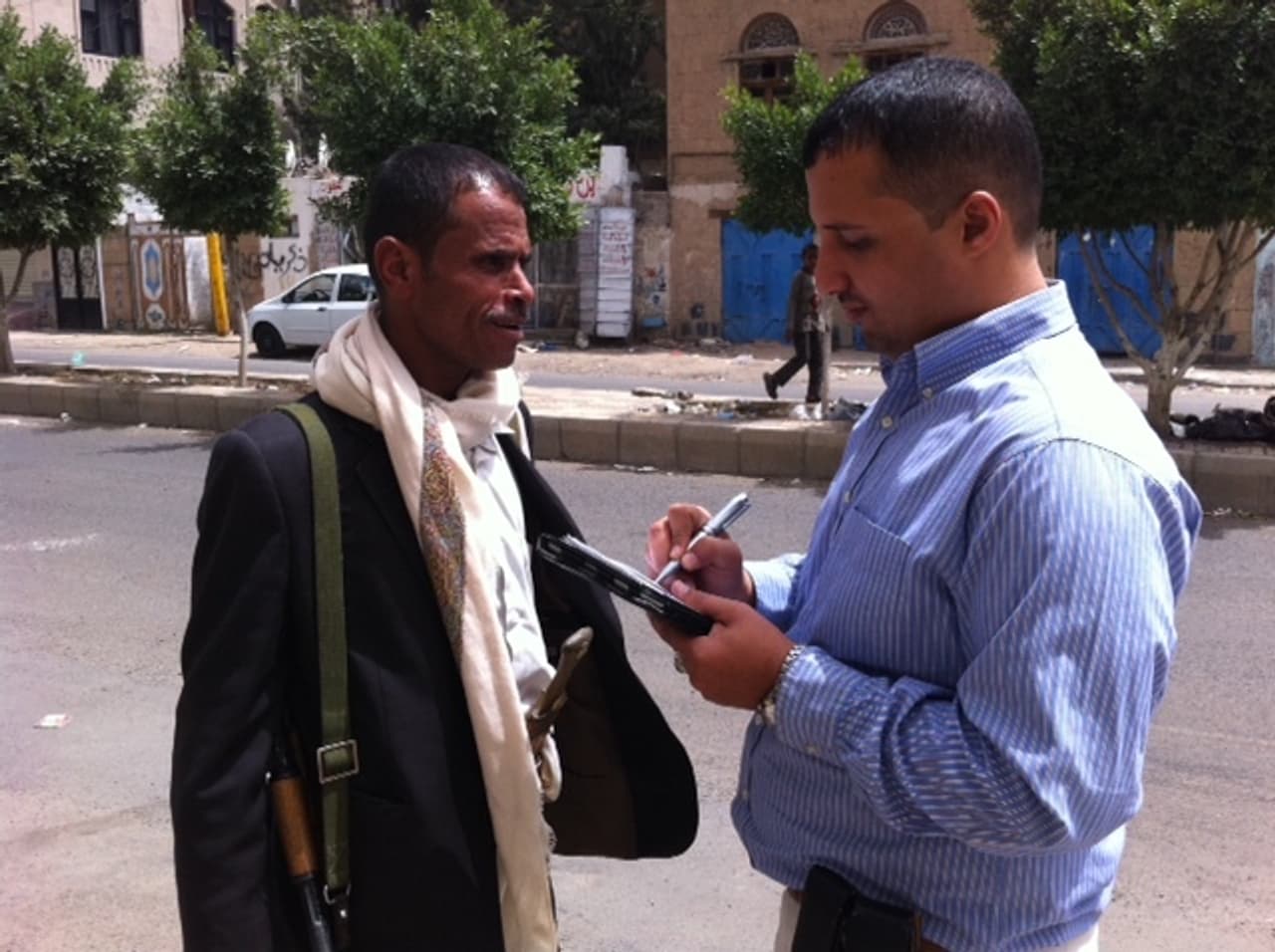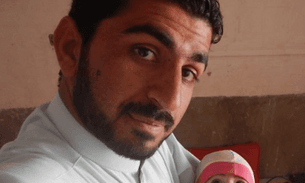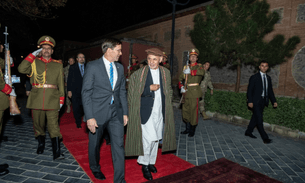
Analysis: Al Qaeda ‘down but not out’, says top Yemen reporter
Hakim Almasmari on the beat in Sanaa.
Al-Qaeda in the Arabian Peninsula may have been pushed back in Yemen, but it is not defeated. At least that’s the opinion of one of the country’s top reporters.
The United States’s covert war has this year been most fiercely fought in Yemen. With al-Qaeda reportedly all but destroyed in Pakistan, the US now believes that the most potent terrorist threat to its own security comes from this impoverished Gulf state.
But in an interview with the Bureau, Hakim Almasmari, a reporter for CNN and editor of the Yemen Post, an English-language newspaper, said he didn’t think al-Qaeda was defeated in Yemen.
‘Because I believe that al-Qaeda wasn’t defeated and they evacuated, I do believe al-Qaeda will have many gains over the next couple of weeks,’ he said.
 He also believes that a deal could have been made between al-Qaeda and the government. ‘Yesterday alone five senior members escaped a prison, a highly secured prison in Yemen. Two days ago, two suspected al-Qaeda militants escaped Aden prison…. Eighty-eight suspected al-Qaeda militants have escaped prison over the last four months alone. It’s a strategy – President Hadi needs to be powerful, he needs the image of being a leader. And sometimes that could mean cooperating or coming to agreements with al-Qaeda to evacuate but in return have some of their members released.’
He also believes that a deal could have been made between al-Qaeda and the government. ‘Yesterday alone five senior members escaped a prison, a highly secured prison in Yemen. Two days ago, two suspected al-Qaeda militants escaped Aden prison…. Eighty-eight suspected al-Qaeda militants have escaped prison over the last four months alone. It’s a strategy – President Hadi needs to be powerful, he needs the image of being a leader. And sometimes that could mean cooperating or coming to agreements with al-Qaeda to evacuate but in return have some of their members released.’
The Bureau has recorded more airstrikes in Yemen so far in 2012 than in any previous year, and more activity than in Pakistan. But precisely who is carrying out most of the strikes remains unclear. Although there have been 63 airstrikes in the past six months, only 17 have been confirmed by US or Yemeni officials as US attacks.
Almasmari, an American of Yemeni descent who moved to the Yemeni capital Sanaa 10 years ago, is one of the few reporters in the country regularly reporting on drone strikes.
We spoke with him just days after al-Qaeda in the Arabian Peninsula (AQAP) and its local ally had been driven out of their southern strongholds.
We began by asking him how easily he could now travel to where most of the recent fighting has taken place.
Hakim Almasmari: Right now all access is open. Whether it’s CNN or the Yemen Post access is completely open. Nic Robertson of CNN also wanted to come to the south and we were able to grant him authorization and permission to enter the south. It’s easier today than it was a month ago.
Q: The Bureau has recorded reports of civilian casualties from three of the last 20 strikes. Are the strikes not killing civilians or are civilian deaths not being reported?
HA: Civilian casualties are almost never reported. The only time when they are reported is when independent sources confirm the news to me and the government officially acknowledges those civilian casualties. But most of the time they are never reported, only when the government is forced to report it.
Related article: Suspected drone strikes kill 12 civilians in Yemen
Q: Do you anticipate any new stories to come out of these areas in the south now that al Qaeda has left?
HA: Because I believe that al-Qaeda wasn’t defeated and they evacuated, I do believe al-Qaeda will have many gains over the next couple of weeks. We will see gains from al-Qaeda over the next couple of weeks in return for their evacuation. Yesterday alone five senior members escaped a prison, a highly secured prison in Yemen. Two days ago, two suspected al-Qaeda militants escaped Aden prison. So it is going to get very dirty. Al-Qaeda needed to evacuate to give the government a good image, but in return they will be given their leaders or members released from prison. This will make al-Qaeda weaker today but stronger tomorrow.
Q: You think there was something underhand in these prison escapes?
Civilian casualties are almost never reported.
HA: Yes, this is not just a random prison escape. Eighty-eight suspected al Qaeda militants have escaped prison over the last four months alone. It’s a strategy – President Hadi needs to be powerful, he needs the image of being a leader. And sometimes that could mean cooperating or coming to agreement with al Qaeda to evacuate, but in return have some of their members released and further dialogue continues under the table between the government and al Qaeda.
Q: Some believe that there will now be a more typical insurgency with guerilla tactics, rather than actual confrontation between the army and al-Qaeda. What is your view?
HA: It’s to be more suicide attacks, more assassination attempts. I mean, al-Qaeda spent millions of dollars trying to control those areas. It was very costly for al-Qaeda. I was one of the few who believes al Qaeda was not defeated in the south. Rather, it evacuated areas of the south, feeling that it needed to change its strategy and return to the old policy of assassination rather than controlling cities and bearing a heavy cost financially for running the streets.
Q: How credible do you think reports are that Yemen Air Force jets are launching airstrikes rather than American drones?
HA: There is no way whatsoever that the Yemen Air Force is conducting all the air strikes. The Yemeni air force is weak and it is conducting some of the air strikes but they result in very little casualties. Eyewitnesses have confirmed that the missiles launched were US-made and US involvement was confirmed in many air strikes, especially in areas where the government has very little to no ground support.
It is worrying that the US drones strategy is increasing in Yemen and even more worrying that it is happening without any coordination with the Defense Ministry. We have talked to numerous Defense Ministry officials on this and they told us that only very very few ministry officials in Yemen know even details of the US drone strikes, which means that it happens in a very un-institutional manner. And the US is helping Yemen become more of a dictatorship rather than an institutional nation. By allowing the drone strikes and no one knowing about it, this way people cannot stand against it or approve it.
Q: The Washington Post has confirmed that US conventional aircraft have been flying missions over Yemen as well as drones. Have you been able to report on this?
HA: There have been three kinds of US strikes: drone strikes, jets coming from Djibouti and strikes coming from the water, from US navy ships. These are the three kinds of attacks that we have been able to confirm from numerous officials in Yemen and all of them have been used in different ways.
Q: Do you think there is a chance the Yemeni government will begin to be more transparent about the air strikes and who is responsible for them?
The US is helping Yemen become more of a dictatorship rather than an institutional nation. By allowing the drone strikes and no one knowing about it, this way people cannot stand against it or approve it.
HA: The Yemeni government will never be transparent when it comes to saying that US drones are involved. They know this could cause an uprising, a major controversy in Yemen. I’ll give you a small example, a story we wrote for CNN a couple of months back. We wrote that four US drone strikes attacked 12 civilians and militants in the south of the country. The Yemeni government released a statement saying that it was the Yemeni air force and not them. One day later, CIA officials confirmed they were drone strikes and not Yemeni air strikes. There’s a lack of credibility in the Yemeni statements.
Q: The Bureau has seen a drop in reported strikes in June. Do you think there are fewer strikes going on now, or do you think fewer are being reported?
HA: I think fewer are being reported these days because right now al-Qaeda is on the run and when they are on the run, they are hiding in areas where journalists cannot reach. Reporting of US drones has decreased greatly due to the inability of journalists to reach the areas where suspected drones are attacking hideouts. In mountainous regions or areas where very few people live and little to no reporting is being done.
Q: You often file more specific reports of drone strikes compared with your peers. For example reporting five strikes in a day when others report ‘many’. How are you able to be so specific?
The Yemeni government will never be transparent when it comes to saying that US drones are involved.
HA: Generally Yemen media tries to avoid covering drone strikes, for one main reason. Those who avoid it are doing so because they do not want to cut the links between them and any US funds or support for certain media outlets or certain publications. It’s very complicated in Yemen, especially when you live in a society where people are trying to report accurately and transparently, but there are many obstacles in the way. But there are always the few who at least do their duty of reporting what they have, even if it’s a little.
Related article: How Twitter mapped a ‘covert’ US drone operation in Yemen
Q: Other international media don’t always report strikes so specifically either.
HA: The international media, on most occasions, tries to ignore reporting US drone strikes if Yemeni media is reporting it. For example, a US strike took place in Aden three days ago. This flooded every media outlet in Yemen. But only very few western media outlets covered that incident or covered it late after being pressured.
Q: You often seem to be separated from other journalists in Yemen in terms of reporting the strikes as drone strikes rather than just air strikes. Why do you think that is?
HA: That is because the officials who we are dealing with and talking to are giving us the sources. When our contacts, and a large number of them, tell us that they were drone strikes, they could possibly know that fact and report it as a strike. So it depends on the information we get that is confirmed from the officials and that’s the path that we take.
Q: So why aren’t the others necessarily following that path?
HA: I think part of them feels that they cannot or do not differentiate between the US drone strikes or US air strikes, thinking that they are the same. Or they don’t have the evidence to prove the difference between the two.
Q: Is it a question of their sources as much as their willingness to report it?
HA: Yes, it’s more having the source to prove that, or knowing the difference between a US drone strike and a US air strike. Generally when we do such reporting on the US drone strike, we make sure that we have at least three senior officials who are credible and they confirm to us that they were drone strikes before reporting it.


